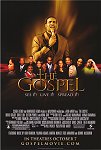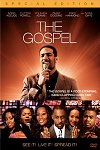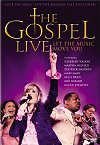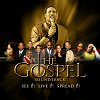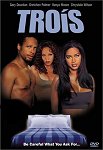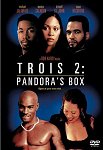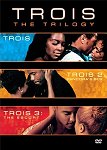writer-director Rob Hardy
(photo by Guy D'alema)
WARNING!
...spoilers ahead...
MD = Michael Dequina; Q = Other press; RH = Rob Hardy
MD: The press notes called the film "semi-autobiographical," so exactly how much of this is you, and how much of this was creative inspiration?
RH: I think that the majority of it was creative inspiration. I feel that there is a little bit of me in every character perspective wise.
MD: So what aspects specifically would be you, then?
RH: I think, for example, having a church background. Obviously I'm not a preacher's kid. But being raised in the church and having that familiarity, and then having the situations in my life that kind of frustrated me. As I was growing up, that kind of sent me going in whatever direction I wanted to be in and doing whatever it is that I wanted to do. But then I was having the same lessons repeat themselves until I was forced to confront them, ultimately bringing me closer to God. So I think that just generally speaking, that would be the main thing. And the other things were like pieces of things that I've seen from other people--especially issues with childbirth, personally dealing with the loss of a parent and what that means, and coming back and trying to make amends for whatever at those end days.
Q: The casting of Boris--whose idea, and just comment on working with him.
RH: Robi Reed-Humes was the casting director, and basically we spent a large amount of time trying to find a lead person that could sing, act, and had the magnetism of a star that would make the audience believe him. So we went through a lot of people, and so she recommended Boris Kodjoe, and my first comment was, "Boris can't sing, so I don't know where that came from." Her response was, "No, Boris can actually sing, and before he became an actor, he cut an album as a singer." But instead his acting career took off, so he pushed the singing aside. So Boris came in, auditioned, and sang like Marvin Gaye. I was very surprised. But actually when we put Boris in the studio to record the tracks for The Gospel, because Boris grew up in Germany and never had the Black church experience, the way in which he sings doesn't really work for the type that we need in a gospel-themed film. It doesn't have the same type of soul, the same kind of inflection. So we brought in somebody to perform for Boris for those songs because we want the gospel community to really have it feel authentic. But if you put Boris on an R&B record, that's a whole other thing that he can do.
MD: So was he on the first song, the R&B song, or is it another singer on all the songs?
RH: There's another singer on all the songs. We were going to have Boris sing the other song, but we wanted to keep the voices consistent. We didn't want it to be like Boris has this distinct voice over here, and there's something else for the rest of the movie.
Q: The "mega-church" culture--do you think that people will look at this and think it was a ringing endorsement or do you think it might be perceived as a little bit of an undermine of the "mega-church" concept and the pastor that oversees it?
RH: Sure. I think that it's really up to what the audience wants to believe. I think that the spirit of it is saying that there's nothing wrong with the "mega-church" culture; there are great things to be had by it, but it depends on the individual. Ultimately it depends upon you and your motivations. For example, you have this "mega-church," which in the film is Divine Souls Ministries, and that's who Idris's character, Reverend Frank, is putting on this pedestal. "I want to be like them; they're flashy," so on and so forth. But what Idris's character was doing was making it about himself. That's why when he had Reverend Isaac Winston--his idol, for lack of a better word--at the building site, his whole perspective was, "I want to take over the world." So now you have the "mega-church" pastor telling him, "Wow, brother, you are ambitious." So even the "mega-church" pastor that has all the trappings of success by wordly standards is saying, "Hey dude, I don't know about what you're doing, but you sound like you're making it all about you." Does that mean that the "mega-church" pastor was like that too? Not necessarily. It just meant that that's what Idris's character was about, and what he was about was the flash. And the interesting thing about that was he basically looked down upon Boris because Boris had this worldly success, and he wasn't in the church, but ultimately that's what he wanted. And Boris essentially looked down on him because he was here, and he represented the church and all that stuff, but Boris secretly envied the relationship that he had with his father. So you have two guys that are really the same people that kind of envy each other.
Q: What were some of the other challenges that were posed to you?
RH: Some of the other challenges as far as making the film were in finding the lead, when trying to find who that person was going to be, a lot of our gospel stars went on tour. Donnie [McClurkin], Yolanda [Adams], Kirk [Franklin] went on the Hopeville Tour, so we had to push back production. Then there was a lot of illness that was on the set because we were shooting, and it was cold. It was raining almost every day, and we were outside, so people were getting sick. Boris--and it's a tremendous blessing--had his daughter Sophie in the middle of the shoot. So when you have a location, then you got a set schedule, and all of a sudden your lead actor is just gone, well now you've got to figure some things out. So that was interesting. And then there was getting things together with Kirk, who was doing the music out of Dallas, and getting the music out here in time to shoot and making sure that everybody had time to rehearse and knew what they were going to do. The biggest thing for me was making sure that it felt authentic, in writing the story and having to make it within the studio system. It was challenging having to compromise on some things and not compromise on some other things and try to make the movie that I wanted to make--and still keep my job. [laughs]
MD: So how was that, working within the studio system for the first time? You usually put your stuff out yourself.
RH: Right. You know, it was interesting because you are beholden to somebody else. So as much as you want to maintain your level of creativity, at the end of the day it's not your film. It's not your say as far as the final script regardless of what is or isn't in there, and then you have to find a way to make that be the best that it can be, and then it's not your say on what's the final cut. Some things you'll agree with and some things you won't, but at the end of the day, I think on a film like The Gospel in particular, it's all part of a bigger plan, which is cool; you understand that "Hey Rob Hardy, you had an opportunity to direct a film, but it's not really about you." It's really about something that's bigger and greater, and I think that's what's at work here. That's how it all came together.
MD: So you're satisfied with how it turned out, with all the studio notes and whatever?
RH: I am.
Q: On MSN News today, there was an article about how some of the studios are trying to market movies through the church. And since this obviously a church movie, is that one of the things that perhaps you guys will be looking at, sending it out to churches and that sort of thing?
RH: Sure. Actually, my partner Will Packer and I have our roots in independent filmmaking, from our first film, Chocolate City down at Florida A&M through independently financing and distributing Trois; and then we distributed Pandora's Box. We're so accustomed because we started out in engineering; we live in Atlanta as opposed to Hollywood or New York. We're such hands-on people that our perspective was with a film like this, we wanted to go out to the to the faith-based community and let them know that this movie is out here. If you don't want to see it, that's fine. If you love it, great; if you don't like it, that's cool too. But we want to make sure that we do everything that we can to let you know about it because that's where we come from, and that's pretty much how we do business here.
Q: Did you have an opportunity to touch base with any of the bishops locally, like Bishop Eddie Long, just for perspectives, or did they offer you any opinions? Anybody?
RH: Sure. Actually Fred Hammond was a big part of the project from an authenticity standpoint as far as coming together from a script. Also [executive producer] Holly Davis-Carter, who has her doctorate in theology, was also instrumental in that as well. Then, of course, Donnie McClurkin had some insight; Hezekiah [Walker] had some insight--so working with these people that are established and that are well-known helped. That's why it was so important for me to marry the worlds--I needed them because I am not a theologian, and even though I am a churchgoer and I'm telling this story from the pews, I still wanted to make sure that I was sensitive to certain things. I didn't want to have the cheating reverend. I didn't want to have the person that was stealing money from the church because I didn't want it to taint the church; I didn't want it to taint the ministry. I just wanted it to be a story about people that have the right frame of mind, but they're flawed in their perspective sometimes. So everybody is trying to behave in a way that they think realizes their truth. Their truth just might be a little skewed. It's funny that you mention Eddie Long--we actually had a screening with New Birth during MegaFest, and so we've gone and had bus screenings in different cities. People like that in different cities that have been coming out and supporting us and hosting these screenings, so that way their congregations will get a chance to know about the film first.
Q: What's your next project?
RH: We're working on a movie about Black college fraternities, kind of like a modern-day School Daze, called Step Show [MD note: The film was ultimately retitled Stomp the Yard.]. We're about to go into pre-production on it.
Q: Do you believe that Atlanta is still conducive for moviemaking?
RH: Totally. Atlanta is a great place to shoot movies. We just signed this huge tax break much like New Orleans had. It's a great city; we have great crews here. The Gospel will actually be the first film to take advantage of the tax incentive. We've shot the majority of our films here. Since then, Tyler Perry just shot a film, and Dallas Austin and Will Smith just shot a film together, and I think there's another film starting to come to the city. So we want more and more people to come to Atlanta and see what the Southeast has to offer.
Rob Hardy at the World Premiere
Next Roundtable: Nona Gaye
BUY THE:
 MOVIE POSTER! MOVIE POSTER!
DVD!
VHS!
LIVE DVD!
MOTION PICTURE SOUNDTRACK CD!

Press Junket Roundtable Transcripts
The World Premiere
The Soundtrack
The Review
Home
External links:
The Gospel: The Official Site
Rainforest Films
Verity Records
NonaNet
House of Tamyra
Boris Kodjoe Official Site
The Gospel @ The Internet Movie Database
The Gospel: Rob Hardy/© Michael Dequina
Photos ©2005 Screen Gems, Inc. All rights reserved.
All images and multimedia files are copyright their respective copyright holders and no rights are given or implied

|

